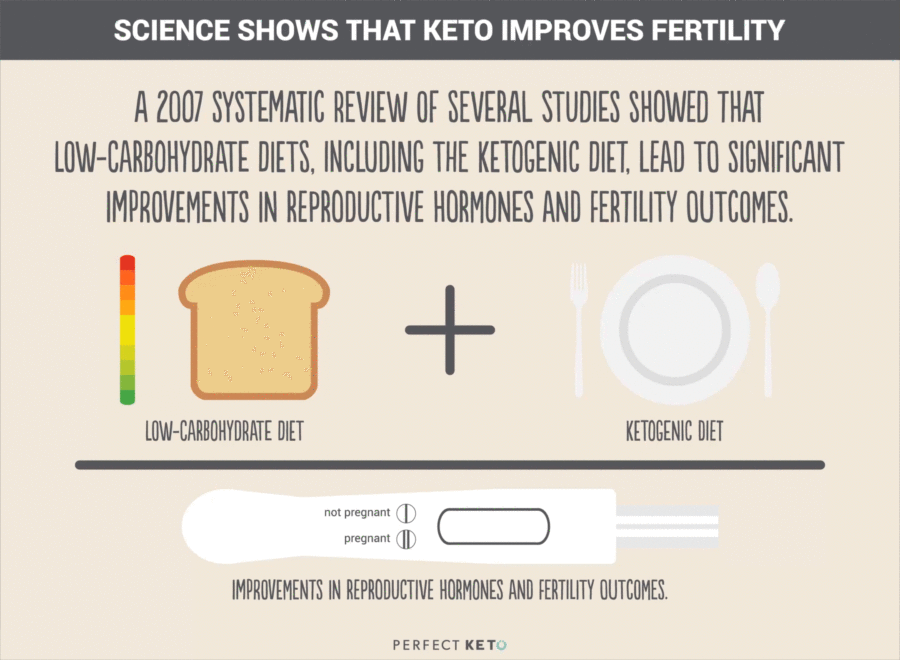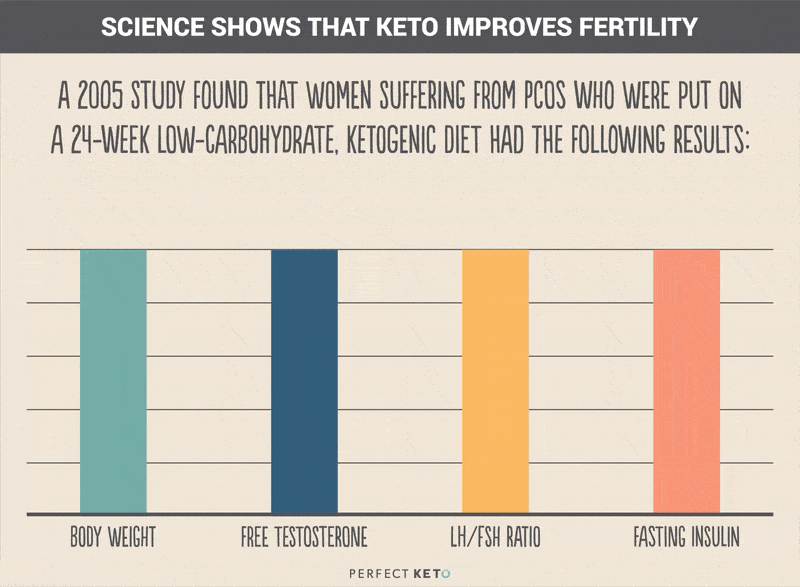If you struggle with getting or staying pregnant, you’re not alone.
The Center for Disease Control estimates that about 12% of women ages 15 to 44 in the United States have difficulty conceiving and carrying a pregnancy to term[*].
That’s about 1 in 8 couples.
In addition, more than 7.3 million women have invested money in infertility treatments that cost an average of $11,000 to $13,000 for just one single treatment (not including any additional medications that are usually recommended).
Sound scary?
What if there was a way to get pregnant and sustain a successful pregnancy without spending your entire retirement savings?
Good news: more research is emerging examining keto and fertility that suggests trying the ketogenic diet may just be the cheap, holistic fertility treatment you’re looking for.
In this article you’ll learn how some of the most common causes of infertility can be reversed by simply changing the food you eat.
Let’s first touch on exactly what infertility is and why it occurs.
What is Infertility?
Infertility is generally defined as the inability to get pregnant after one year. Although it is often thought to be only a condition affecting women, in about 35% of couples with infertility, there is an issue involving the male as well.
So, what actually causes infertility?
Well, there are many steps that have to occur to become pregnant and issues may result from a problem with one or several of these steps.
The basic steps to become pregnant include the following[*]:
- A woman’s body releases an egg from one of her ovaries (also known as ovulation).
- A man’s sperm must join with the released egg (also known as fertilization).
- The fertilized egg must make its way through the woman’s fallopian tube towards the uterus (or womb).
- The fertilized egg must attach to the inside of the uterus (also known as implantation).
As you can see, there are a few different places where things can go wrong. In the rest of this article, we’ll focus on the most common causes of infertility in women and what the research shows to be a very affordable and practical way to help treat and possibly prevent these causes.
PCOS and Fertility
One of the most common causes of infertility among women is a disorder called PCOS or Polycystic Ovary Syndrome.
PCOS affects 1 in 10 women of childbearing age[*] and the exact reason for this disorder is still unknown. But, most experts agree that there are two main underlying causes:
#1: High Levels of Androgens (“Male Hormones”)
Androgens are a group of hormones often referred to as the “male hormones.” But both men and women produce androgens, just in different amounts.
In women, androgens are produced in the ovaries, adrenal glands and fat cells and play a key role in many hormonal functions such as estrogen synthesis (creation of estrogen), puberty, prevention of bone loss, sexual desire and much more.
However, excess amounts of androgens in women can cause several issues including absent or irregular menstrual cycles, acne and extra hair growth, all common signs and symptoms of PCOS.
#2: High Levels of Insulin
Insulin is another important hormone that controls how your body changes the food you eat into energy by absorbing glucose (sugar) from your bloodstream and shuttling it into your cells.
When insulin is chronically elevated, usually due to an excess of carbohydrate intake and physical inactivity, it can lead to a disorder known as insulin resistance.
This disorder occurs when your cells stop responding normally to insulin and cannot easily absorb blood glucose from your bloodstream. This leads to your body needing to produce more and more insulin to keep up with the blood glucose demand.
High insulin levels stimulate the ovaries to produce more androgens and as we know from above, this can lead to the development of PCOS.
Studies show that over 70% of women with PCOS have insulin resistance[*] and therefore experts believe it is the leading cause of this disease.
Additionally, statistics show that over 80% of women in the U.S. with PCOS are either overweight or obese[*].
Obesity and Fertility
Obesity is another common cause of infertility in women. Research shows that women who are overweight or obese tend to struggle with menstruation and ovulation issues, conception rates, miscarriages and other pregnancy complications[*].
Several studies found that the risk of infertility is 3x higher in obese women than in non-obese women[*] and one study found that a larger portion of women who are seeking medical help to get pregnant are obese[*].
Because the ketogenic diet is very beneficial for weight loss and controlling insulin levels, it has become extremely popular as an effective tool to enhance fertility outcomes.
Research is continuing to emerge that a low-carbohydrate, ketogenic diet can help combat issues associated with PCOS and obesity, including healing reproductive hormones.
Before we dive into the results of these studies, it’s necessary to understand what the various reproductive hormones are and how they relate to fertility.
Understanding Reproductive Hormones
Above we discussed androgens and insulin, two hormones that play an important role in fertility outcomes. But, they’re not the only ones.
Let’s take a quick look at some of the other hormones who’s levels can impact the ability to become pregnant.
#:1 Testosterone
The most common androgen is testosterone and although it is usually associated with males, all women have testosterone in their bodies too.
Sometimes even a slight increase in testosterone in women (above normal levels) can suppress normal menstruation and ovulation leading to difficulties for women trying to get pregnant.
#2: Estrogen
Estrogen is the primary female sex hormone that is secreted mainly by the ovaries and in small amounts by the adrenal glands. The most active estrogen in the body is known as estradiol.
An imbalance in estrogen levels can prevent ovulation and inhibit the lining of the uterus to thicken enough to allow fertilized eggs to implant and therefore lessen the ability to get pregnant.
#3: Progesterone
Progesterone is a hormone primarily produced in the ovaries after ovulation occurs and is important for supporting a developing embryo (an unborn offspring).
Normal progesterone levels should be low at the beginning of the menstrual cycle and high after ovulation. If progesterone levels are too low, difficulties with implantation of eggs in the uterus can occur, leading to a decrease chance of pregnancy.
#4: Sex Hormone Binding Globulin (SHBG)
Sex Hormone Binding Globulin (SHBG) is a protein that is produced by the liver and binds to hormones such as testosterone and estrogen and transports them in the blood.
Abnormal decreases in SHBG are associated with issues of menstrual function and fertility.
#5: Prolactin
Prolactin is a hormone produced in the pituitary gland (a pea-sized structure located at the base of the brain) that stimulates breast development and milk production.
High levels of prolactin may cause infertility by inhibiting ovulation.
#6: Luteinizing Hormone (LH)
Luteinizing Hormone (LH) is a hormone produced by both men and women that plays a major role in puberty, menstruation and fertility.
Abnormal LH levels can affect fertility by causing problems with the supply of eggs in women’s ovaries and the supply of sperm in men.
#7: Follicle Stimulating Hormone (FSH)
Follicle Stimulating Hormone (FSH) is another hormone produced by both men and women that works side-by-side with LH.
FSH stimulates the growth of eggs in women and the production of semen in men. Thus, abnormal FSH levels could hinder the ability to reproduce.
The LH/FSH Ratio
For proper egg development to occur in women, LH and FSH each need to be present at certain levels and specific times during the normal menstrual cycle. The normal ratio is about 1:1, meaning the LH and FSH levels in the blood are similar.
In women with fertility issues, especially those with PCOS, the LH/FSH ratio can often be higher. For example, 2:1 or even 3:1.
Although these are not all of the reproductive hormones, they are the most common ones tested when issues of fertility are present.
Now, let’s dive into how keto plays a role in all of this.
What Does the Research Say?
Now that you know what the different reproductive hormones are and how abnormal levels of these hormones can affect fertility outcomes, let’s look at how low-carbohydrate, ketogenic diets can help to promote positive improvements in these hormonal levels and other conditions that are known to reduce fertility.


- 12% decrease in body weight
- 22% decrease in percent free testosterone
- 36% decrease in LH/FSH ratio
- 54% decrease in fasting insulin
As discussed above, the decreases in these levels are positively associated with increased fertility outcomes.
Additionally, two of the women in this study became pregnant despite previous infertility issues.
A 2014 study including obese women undergoing fertility treatment found that compared to the control group, women following a structured, low-carbohydrate diet for 12-weeks had significant improvements in pregnancy outcomes[*].
Compared to the control group, the women in the low-carb diet group:
- Lost an average of 20 pounds in just 12-weeks.
- Achieved a pregnancy rate of 48% compared to 14% in the control group.
- Took an average of two fertility treatment cycles to achieve each pregnancy compared with four treatments in the control group.
- Had a 44% increase in the number of live births compared to only 14% in the control group.
In addition to the scientific studies that are rapidly emerging with results that support low-carbohydrate, ketogenic diets for fertility outcomes, there are also a ton of anecdotal (personal) accounts of women from across the world who have become pregnant after adopting a low-carb, keto lifestyle.
There are even Facebook groups and various forums popping up for women to join and talk about their fertility successes as they relate to a ketogenic approach.
So, now that you have an idea of how keto can help address some of the causes of infertility, I’m sure you’re wondering where to begin.
How to Begin Keto For Fertility
If you’re completely new to keto, check out The Ultimate Start Up Guide and become familiar with the different stages that will help you successfully learn and implement the ketogenic diet.
If you’ve dabbled with keto before but need a refresher, read through The Ultimate Guide to Ketosis to get back on track and check out some of our other blog posts for a more in depth explanation on certain keto-related topics.
And if you’re a mom to be or curious how keto will affect breastfeeding, take a look at this article to clear up some of your doubts.
As mentioned before, there are various platforms where women are coming together to talk about their success with becoming pregnant and healing through the use of a ketogenic diet. Below are a few different Facebook groups that you can join with thousands of women who are using keto to get pregnant and sharing their stories:
- Keto Pregnancy Keto Mommy
- Low-Carb/Keto Pregnancy & Breastfeeding Support Group
- Keto/Low-Carb Better Pregnancy and Breastfeeding Support
Because keto is so new, some doctors still have trouble accepting it. Use the resources above to educate your doctor and work with them to come up with a plan that you are both comfortable with.
The key to understanding is being educated and finding what works for you.